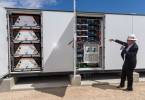Delinquency shutoffs rise significantly at NV Energy
The recession is taking an uneven toll on utility ratepayers as consumers choose between keeping the lights on or the phone lines open.
Local electric utility NV Energy has experienced big increases in the number of Las Vegas households it has had to disconnect for nonpayment of bills, but other utilities have seen delinquency-related disconnections fall.
Observers cited numerous potential reasons for the differences, including falling prices for some services and an interest among the unemployed in keeping phone and Internet access going for job-hunting purposes. Plus, some experts say, consumers gravitate toward paying smaller, more manageable utility bills.
At NV Energy, power shutoffs from delinquencies in the Las Vegas area jumped 17 percent from September 2008 to September 2009 when compared with the same period a year earlier. That's substantially higher than the increase in the company's shutoff rates statewide, which rose 9 percent in the same timeframe.
Bruce Bullock, a customer-service executive with NV Energy, wouldn't speculate on why local ratepayers lag so much more than their counterparts in other parts of the state. But Las Vegas does have poorer economic indicators than many other parts of Nevada: Clark County's unemployment rate is 13.9 percent, compared with 13.1 percent in Reno and 12.8 percent in Carson City. In most of the state's rural counties, joblessness ranges from roughly 7 percent to 10 percent. Las Vegas also has one of the nation's highest home-foreclosure rates.
Bullock said NV Energy has also recorded a 17 percent spike in the number of payment plans it has arranged for customers looking to avoid disconnection for nonpayment.
"When customers have trouble paying their bill, we encourage them to contact us sooner rather than later, so we can spread the amount they owe over several months," Bullock said.
Other local utilities said they're not seeing big gains in disconnections from nonpayment. But comparisons to NV Energy could be difficult, because virtually everything in the home or office runs on energy, so power bills tend to be higher than other utility bills. NV Energy's residential invoices range from a monthly average of $129.38 in winter to $263.83 in summer.
At phone and Internet provider CenturyLink Nevada, where monthly bills range from $10.43 for basic phone service to just under $70 for a combination of phone, high-speed Internet and digital-television service, delinquency-related shutoffs are down about 2 percent in Las Vegas since 2007, said Vice President and General Manager Jeff Oberschelp.
Oberschelp said phone and Internet service are especially important to locals who've lost their jobs, because many employers require job candidates to apply for work online.
CenturyLink also encourages delinquent customers to take their bills to one of the company's seven retail centers and ask representatives for help with payment plans or service packages that could reduce their costs.
Delinquency turnoffs at Southwest Gas are also on pace to come in lower in 2009 than they were in 2007.
The gas utility interrupted service to 51,804 households in 2007 in its Southern Nevada market, which also includes parts of Needles, Calif., and Bullhead City, Ariz. In 2008, Southwest Gas halted service to 40,361 delinquent households. From January through October, it disconnected 43,025 households.
Looking at October alone, Southwest gas disrupted service to 4,384 households in 2007, 3,480 households in 2008 and 3,782 households in 2009.
Cynthia Messina, a spokeswoman for Southwest Gas, said she wasn't sure why shutoffs have been lower so far in 2009 than they were in 2007, but she noted that natural gas costs less today than it did two years ago. Plus, consumers are conserving more, and newer, more-efficient homes allow them to use less natural gas.
The average residential bill from Southwest Gas is $73 in winter and $29 in summer.
Cable, phone and Internet company Cox Communications is privately held and doesn't provide numbers on delinquency-caused shutoffs. But the company's local communications manager, Juergen Barbusca, said Cox has a little more than 415,000 local basic-cable subscribers, down "just slightly" from its customer base a year ago. The company charges $50.95 a month for its 96-channel TV Essential cable service, and its bundled packages with phone service, cable TV and Internet access start at $94.99 a month.
Barbusca said the small drop in customers probably comes from a multitude of factors, including delinquency disconnections and voluntary shutoff requests from customers who move out of Nevada, switch to a different TV or Internet provider or decide to cut cable from tight budgets.
The Las Vegas Valley Water District was closed Friday and unable to provide figures for this story.
Andrea Fountain, social-services manager for the Nevada Energy Assistance Program, said consumers often think it's easier to tackle smaller bills. But focusing exclusively on lower bills isn't the best strategy, she said, because making even a partial effort to pay larger bills will often make a utility more willing to work with a consumer.
Representatives with all four utilities said they'd rather work out long-term payment plans than shut off service.
"We make every effort to work with our customers," said Messina, of Southwest Gas. "Turning off customers' service is a last resort. We encourage them to call us if they're having problems so we can put a plan in place."
Contact reporter Jennifer Robison at jrobison@reviewjournal.com or 702-380-4512.























